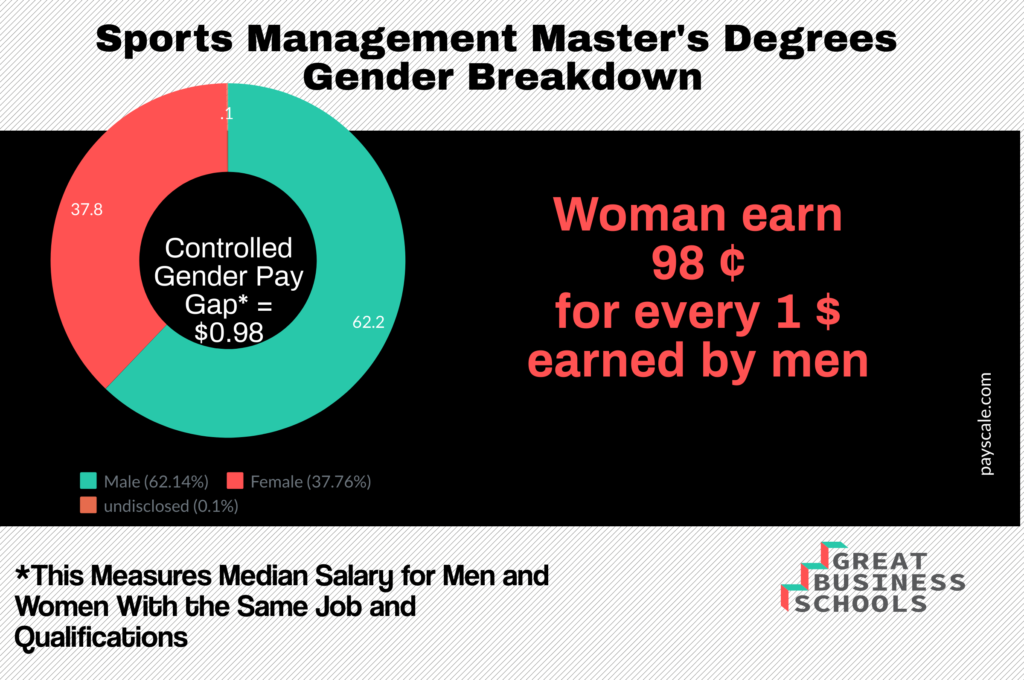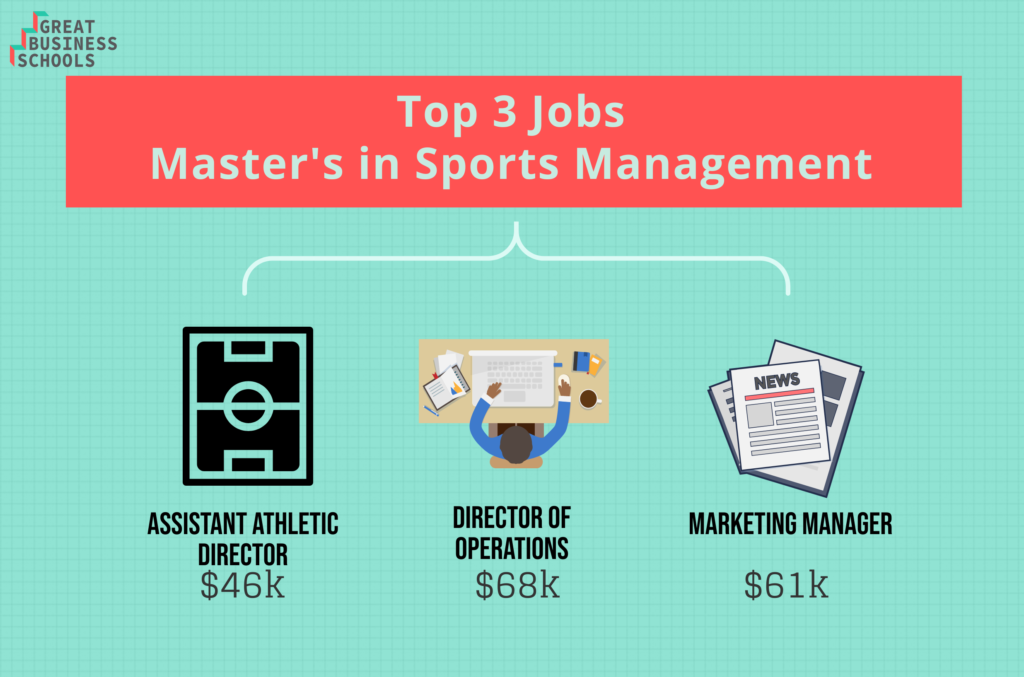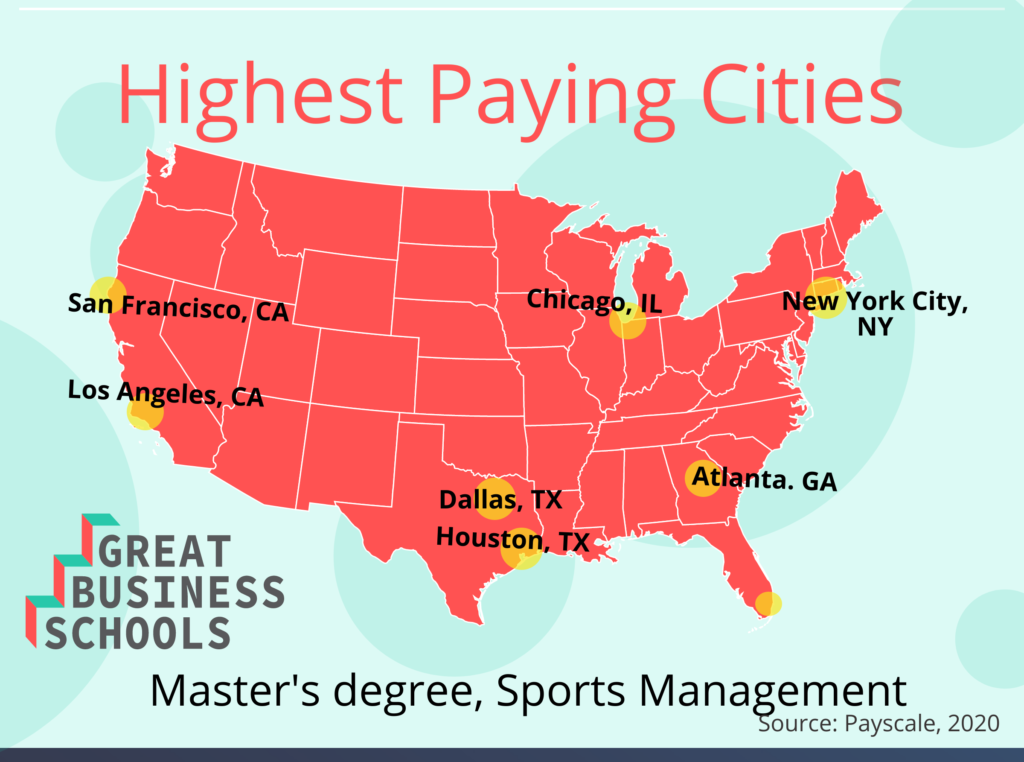From an academic degree perspective, Sports Management is a relatively new discipline in both the industries of sport and management. Have you developed an interest in a sports management career? Or have you hit the limits of where your career can go with just a bachelor’s in sports management?
If so, have you taken the time to consider – Is a masters in sports management worth it? In other words, does the time and effort required to earn a sports management degree pay off in the long-run?
The curriculum for a sports management graduate degree generally covers a broad interdisciplinary business approach with foundational teachings in economics, finance, and marketing, among others.

If you have considered a professional career in sports management, it is essential to answer questions such as these as you research your academic and program options.
- What can I do with a master in sports management?
- How many months does it take to complete a master’s degree in sports management?
- Are there sports management degree programs that are available online?
- Is a masters degree in sports management worth it – it – being the effort required to earn the degree?
To answer the question – What can I do with a master in sports management? – read the narrative that follows.
Accreditation for Sports Management Master’s Programs
The process of accreditation is a specific oversight procedure performed by third-party professionals (i.e., neutral parties with authority to perform such functions) that through a comprehensive evaluative process seeks to ensure that the sports management program’s contents – promised by the school – is the education a paying student receives when choosing to enroll in the program.
There are several levels of school or degree program accreditation in the education arena in the United States. Certain accreditation is performed by specific academically-oriented government agencies. Other types of accreditation are done by private, professional organizations that are often sanctioned by government education and industry experts alike. Professional oversight agencies assess professional schools, universities, colleges, and the programs they offer.
The process of accreditation is formally recognized through a formalized, intensive assessment process – if the program/school meets the criteria set forth by the industry and/or pre-determined academic standards. If the program/school meets these pre-defined accreditation standards, the school or program is granted accreditation and the capability of notifying students interested in the school or program of the earned accreditation.
The ultimate goal if accreditation is to ensure that a potential student has a full understanding that the program or school is regularly assessed to determine if the school is upholding the course content to accreditation standards.
This first type of accreditation – Regional Accreditation – is the broadest type of accreditation. Specialized accreditation is a voluntary process that is generally done by industry sanctioned professional oversight agencies.
Regional Accreditation
The United States Department of Education is the federal government organizes its six regional offices throughout the nation. Each regional accrediting agency has a specific region in which to assess schools in their defined for their merit and content.
For the most part, regionally accredited institutions of higher learning are typically nonprofit, academically-oriented, or state owned.
Specialized Accreditation
Specialized accreditation that is awarded to an academic degree program or school provides some assurance to students that the school or program they are attending will prepare them for a rewarding, successful career in sports management. Specialized accreditation is a voluntary process and requires school officials to allow accreditation officials to evaluate the school and program according to a set of pre-defined standards.
It is important to note that students who transfer between schools while earning a degree will discover that earned credits from an accredited institution of higher education are much more readily accepted by the school one wishes to transfer. In fact, many higher learning institutions do not allow the transfer of credits that have not been awarded by an accredited college or school.
Many business schools are accredited by the AACSB, but there are many schools in the country – both on-campus and online – that have received sports management accreditation. This includes a variety of accredited sports management masters programs.
The Commission on Sport Management Accreditation (COSMA)
The Commission on Sport Management Accreditation (COSMA) is a CHEA (Council for Higher Education Accreditation) recognized accreditation agency that is sanctioned to accredit schools and programs for academic quality.
The Commission on Sport Management Accreditation is a specialized sport management accreditation body that seeks to encourage and promote quality in academic degrees offered to sports management degree candidates seeking professional careers in the industry. A COSMA accreditation offers students an assurance of quality – a sort of seal of approval.
The Commission on Sport Management Accreditation is tasked with the responsibility of evaluating sports management academic degrees at the bachelor’s , master’s, and doctoral levels. COSMA’s mission is–
- To promote confidence in sports management education.
- To assure employers that graduates have met industry standards of education.
Specialized accreditation is a worthwhile process that benefits everyone – from the public to employers and students, plus sports management schools and universities. The accreditation process offered by COSMA requires schools and programs to consistently strive to improve the quality of the sports management academic options available to students interested in the field.

Types of Sports Management Master’s Degrees
One of the benefits of earning a master’s degree in sports management degree is that the degree offers many types of career opportunities.
For those individuals who wish to be a part of the business side of professional or collegiate-level sports, a master’s in sports management degree is a great option that opens the door to a plethora of rewarding careers. If you are considering a master’s degree in sports management, it is prudent to check out all of the available online masters in sports management programs, as there are a variety from which to select.
Consider this ] partial list of the different types of sports management masters degree program ideas available in the education marketplace –
- Check out the master’s degree in sports management with an athletic administration emphasis.
- Many online sports management masters programs include the science of kinesiology and related topics.
- Certain sports management masters online programs offer an educational concentration that can lead to a career as a physical education specialist or even a personal trainer.
- Business fanatics have many options to enroll in an online master’s in sports management program that has been integrated into a Master of Business Administration (MBA) program curriculum.
- There are sports management masters online degree programs that highlight a concentration in tourism and recreation, with an emphasis on the hospitality sports industry.
- For students interested in a career that involves sports policy-making, there are masters in sports management online programs with a defined emphasis in the areas of policy and leadership.
- Statisticians and metric lovers can enroll in a master’s in sports management online with a strong analytical and mathematical emphasis.
- Students interested in working within the legal aspects of the business of sports can opt to earn an online sports management master’s in sports law to become professionally involved in contract preparations and negotiations.
- There is a variety of masters in sports management online degree programs devoted exclusively to the psychology of sports and sports performance enhancement.
- Promotion and advertising students have the option of earning a master’s in sports management degree in marketing, with a specialty in sports promotion.
As you continue to search for the masters in sports management program that meets your education, career, and budget goals, be certain to decide if you want a Master of Arts (MA) degree in sports management masters online or Master of Science (MS) degree program with masters in sports management on-campus. There are different requirements to earn a master’s degree in sports management than earning an MA sports management master’s online degree.
Sport Management Certifications & Licenses
The art of sports management attracts professionals from many different backgrounds, which is likely why there is no one-primary path to a career as sports agent or manager.
Several states have passed laws that require professional sports managers to become licensed in that state and to carry professional liability insurance as a requirement to maintain the license issued. These licenses are generally issued for noncombative sporting activities over and above what any professional league will typically require. States like Tennessee, California, and Maryland require an application fee and a background check, among other criteria.
To determine if your state mandates a sports agent to be licensed, it is best to reach out to the state’s professional regulation board.
Sports Management Certification and League Licensing
Sports managers and agents must hold a sports management certification with the league in which their clients participate. If there is more than one league, there will be a need for more than one certification for each league.
These sports management certifications are issued by each professional sports industry. As such, to date, there are no universal sport management certifications that cover all sports industries.
Sports Management Graduate Certificate Programs
Individuals who have considered earning a graduate certificate in sports management can do so on-campus, choose to earn a graduate certificate in sports management online or opt for hybrid delivered format. The online options for sports management programs allow students the flexibility to study when their time and schedule permits.
Sports management certifications are available in many specialties. A partial list of these certifications includes –
- A graduate certificate in sports management with a specialty in sports analytics
- A sports management certification online that emphasizes facilities management and event planning
Additional sports management certifications include the areas of exercise science, risk management in the sports industry, public relations for sports teams, and recreational and community program management, to name a few.

Careers with a Master’s in Sports Management
There is a large variety of jobs for masters in sports management degree holders. However, it is easiest to roughly categorize these masters in sport management jobs based on the general area of the work. Unless you have a unilateral career and academic direction, which is more unusual than common, it is important to consider these questions as you decide which direction to look for jobs for sports management masters degree holders. When searching for jobs with a masters in sports management degree already earned, consider –
- What type of masters in sports management jobs are available that will allow for international travel?
- Which sport management masters jobs are available as entry-level positions?
- How can my current MBA help me find jobs with a sports management master’s degree?
- Is it possible to find jobs with a sports management masters that allows me to be involved in the Olympics?
- Which types of jobs for masters in sports management degree holders will take you down on the field on game day?
- Can I find a sports management masters jobs that will allow me to pursue my marketing career goals as well?
- Are there jobs for sports management masters degree holders that do not include sales?
For instance, students interested in sports management masters jobs that prefer to stay close to the athletic action choose careers as –
- An Athletic Director
- A Coach
- An Athlete Development Coordinator, to name a few
Sports Management professionals interested in the business side of the sports industry, choose careers with sports management masters degree like –
- An Athletic Operations manager is often one of the more popular jobs with a masters in sports management.
- An event coordinator
- A Sports Agent
- A Facilities Manager
- A Business Development Specialist
- A Fraud Investigator
- A Financial Analyst
Those interested in pursuing masters in sports management careers with regard to the legal end of the sports industry, find rewarding work as –
- A sports lawyer, if the candidate obtains a law license.
- A contractor negotiator
- A sports mediator or arbitrator
- A compliance manager
- A Sports Agent, to name a few
Many sports management masters jobs fall in the realm of recreational and community activities and planning. Additionally, masters in sports management jobs are available as –
- A sports blogger
- A sports camp administrator
- A digital or video editor or reporter
- Social networking manager
Finally, there are many sales opportunities for those interested in masters in sport management jobs.
- Sports Supplies and equipment
- Ticket management and sales
- Brand management
Masters in Sports Management Salary Information
One of the most important facets of deciding upon a career or academic direction is to consider the earning power afforded to those who earn a master’s in sports management degree. It is smart to begin within, making sure you have a full working knowledge of just what a sports marketing management job description will include. It is also important to recognize if there are specialized sports marketing manager jobs that pique your interest. According to Payscale.com, the average master’s in sport management salary per year is $51,832. This annual average salary translates to an average hourly sports management master’s salary of $19.01.
Glassdoor reports the average base sports management salary with masters degree to be $69,239 per year, based on nearly a quarter-million anonymously submitted salary submissions. Glassdoor.com further reports that that the range for a masters in sports management salary begins on the low range at $42,000 per year and tops off at about $133,000 per year.
The United States’ Bureau of Labor Statistics (BLS) categorizes sports management and marketing jobs as Business Agents for Athletes, Artists, and Performers. The statisticians at BLS further refines these sports marketing manager jobs by the industry as follows –
| Sports Marketing Manager Jobs – By Top Paying Industry | Masters in Sports Management Salaries |
| Legal Services for Sports Marketing | $107,800 per year |
| Profession & Business (etc.) Organizations | $104,750 per year |
| Spectator Sports | $104,530 per year |
| PR and Advertising | $ 96,200 per year |
| Scientific R & D | $ 95,750 per year |
Geographically, the states with the highest employment level for sport management marketing jobs –
| Sports Marketing and Management Jobs – Highest Employment by State | Number of Jobs that Meet Sports Marketing Manager Job Description | Masters in Sports Management Salaries |
| California | 6,300 | $ 96,470 per year |
| New York | 3,230 | $103,230 per year |
| Florida | 920 | $ 90,500 per year |
| Tennessee | 690 | $ 73,440 per year |
| Texas | 390 | $ 82,750 per year |
Geographically, the top paying states for sport management marketing jobs include –
| Sports Marketing and Management Jobs – Top Paying by State | Number of Jobs in Sports Marketing and Management | Masters in Sports Management Salaries |
| The District of Columbia | 190 | $116,140 per year |
| New York | 3,230 | $103,230 per year |
| Wisconsin | 60 | $102,330 per year |
| Kansas | 30 | $ 99,290 per year |
| California | 6,300 | $ 96,470 per year |
The top paying metropolitan areas for sport management marketing jobs include the following breakdown of a masters in sport management salary throughout the nation –
| Sports Marketing and Management Jobs – Top Paying Sports Management Master Salary by State | Masters in Sports Management Salary |
| DC – VA – MD – WV Metro Area | $131,820 per year |
| Anaheim, Santa Ana, Irvine, CA | $122,320 per year |
| Miami, Miami Beach, Kendall, FL | $105,780 per year |
| NY NJ and White Plains, NY | $102,550 per year |
| Nassau & Suffolk County, NY (Long Island) | $100,200 per year |

Sports Management Professional Organizations
Like most industries, the sports management industry has several sport management professional organizations that offer a multitude of benefits to those who choose to join. Here is a list of some of the more popular sport management professional organizations.
The NACDA – The National Association of Collegiate Directors of Athletics
The NACDA – the National Association of Collegiate Directors of Athletics (NACDA), is the largest professional organization dedicated to collegiate athletic administrators. With more than 12,000 members that hail from the U.S., Canada, and Mexico. The NACDA offers sports management students unique internship programs, plus a host of networking events for members. Other benefits of joining the NACDA include
- Training
- Workshops
- Clinics
- Seminars
- An exchange of idea
The NACDA – The National Association of Collegiate Directors of Athletics also holds a yearly convention for its members where they offer interactive seminars, plus a litany of programs for scholarships.
The North American Society for Sports Management
The NASSM – the North American Society for Sports Management is comprised of professionals and students who are involved in the sports, recreation, leisure, sectors. The North American Society for Sports Management seeks to promote professional development, and research for sport management professionals. This organization is the publisher of the Journal of Sport Management.
The NASSM includes students on their executive committee and asks student reps to help design events for the organization’s yearly conference. The NASSM maintains an up-to-date job board for sport management professionals.
College Sports Information Directors of America
CoSIDA – The College Sports Information Directors of America was established in the late 1950s, as it is recognized as the 2nd oldest professional organization dedicated to sports management professionals. CoSIDA’s membership exceeds 2,900 members (mostly from the communications, sports public relations, and media relations areas) from various facets of the field of college sports.
The more senior members of CoSIDA often perform as mentors to help guide younger professionals with professional development advice as they begin their careers. This includes the provision of continuing education and mentorships that often lead to leadership positions.
The Sports Marketing Association
The Sports Marketing Association (SMA) is a nonprofit professional sports organization that seeks to develop meaningful connections between sports management degree candidates with the world of sports marketing.
In addition, SMA offers continuing education coursework and opportunities that allow members to build knowledge through networking and marketing strategies. Its annual conference is a key event that allows industry leaders to meet future talent. The annual conference is also when the industry releases key industry insight and recent research results and conclusions.
National Association of Collegiate Women Athletics Administrators
The NACWAA – THE National Association of Collegiate Women Athletics Administrators is a professional organization developed to embolden women seeking athletic administration careers. NACWAA offers mentorship opportunities and continuing education to members to encourage professional development and success for women leaders in the field of sports management.
The NACWAA offers four leadership tracks and a renowned symposium for women sports management graduates entering the profession. Other benefits include networking options, job boards, and discussion boards, to name a few.
Carrie Morris
Author
Warren Dahl
Editor-in-Chief

